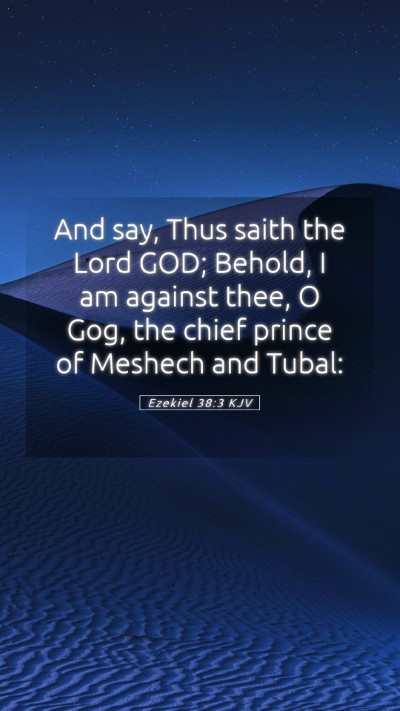Bible Verse Commentary: Ezekiel 38:3
Verse: "And say, Thus saith the Lord God; Behold, I am against thee, O Gog, the chief prince of Meshech and Tubal."
Understanding Scripture
Ezekiel 38:3 is a prophetic declaration that has elicited various interpretations throughout history. The essence of this verse is the Lord's opposition to Gog, representing a significant adversary of God's people, specifically within the context of the prophetic message given to the prophet Ezekiel. This passage is pivotal to biblical eschatology and is often interpreted within the framework of last-day prophecies.
Bible Verse Meanings
This verse signifies God's active involvement in human affairs, especially concerning nations and leaders that oppose His will. The name Gog—often associated with the leader of a coalition against Israel—embodies rebellion against God and highlights the spiritual and temporal struggles that the people of God face.
Bible Verse Interpretations
Matthew Henry’s commentary emphasizes that this assertion of God being against Gog indicates divine sovereignty over nations. Henry suggests that the imagery of Gog symbolizes all the oppressors of God's people throughout history. Similarly, Albert Barnes states that this prophecy signals God’s judgment upon those who rise against His covenant community.
Scripture Analysis
In analyzing Ezekiel 38:3, one must consider the historical context during which Ezekiel prophesied. The nations of Meshech and Tubal were located in what is now modern-day Turkey, and they often represented broader powers that threatened Israel. Adam Clarke elaborates on the significant implications of God's opposition to Gog, viewing it as a representation of the ultimate confrontation between good and evil that culminates in eschatological themes throughout both the Old and New Testaments.
Bible Study Insights
This verse serves as an essential reminder of God's omnipotence and His promise to stand against all forms of evil. Such insights can be particularly applicable in Bible study groups, where discussion can delve into how modern applications may reflect similar themes of divine protection against adversaries, both spiritual and physical.
Applying Bible Verses to Daily Life
Understanding this verse also encourages believers to reflect on their own lives in the context of God’s sovereignty. It serves not only as a historical account but as a personal reminder of God's ability to oppose the “Gogs” in our lives that challenge our faith and well-being.
Cross References
- Ezekiel 39:1-2 – The defeat of Gog as prophesied.
- Revelation 20:7-9 – The final battle against Gog and Magog.
- Isaiah 17:1 – Prophecy concerning Damascus, reflecting a broader theme of judgment.
Historical Context of Bible Verses
The historical backdrop of Ezekiel's prophecy is critical to understanding its implications. The Babylonian exile set the stage for God's message of hope and eventual restoration to His people. This context reinforces the significance of God's opposition to Gog and illustrates the divine favor resting on Israel amid its trials.
Significance of the Verse in Background of Ezekiel
Ezekiel is often labeled as a watchman, and in this capacity, his role was to sound the alarm regarding impending danger. His proclamation about Gog exemplifies a larger theme of prophetic warning, intended to direct the focus back to God’s sovereignty and faithfulness, reassuring the people of impending deliverance.
Conclusion
In summary, Ezekiel 38:3 encapsulates a wealth of meaning regarding God’s sovereignty over nations, prophetic warns of judgment, and the assurance of divine protection. Delving into this verse can yield significant Bible study insights that apply to believers' daily lives, encouraging a deeper understanding of God's role throughout biblical history and in contemporary situations.


